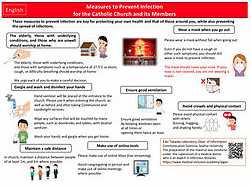
Reflections on the Lord’s Transfiguration
(Second Sunday of Lent)
I think that today’s bible texts show us that we are called in one way or another. And we answer. We have answered by being here today. We say, with Peter, “Lord, it is good for us to be here.”
We look back at Abram called to leave his comfortable homeland and go only God knew where. He followed and became our father in faith—and not only of us Christians but also of Jews and Muslims. We all trace back to one common root in Abram, who never doubted his call, though he had a few questions about it, like “How shall I know this will happen?”
The first disciples, too, were called to leave their life as fishermen, tax collectors, and what not. They followed Jesus, and today we see three of them with Jesus on the mountain. These are the same three that saw him raise the daughter of Jairus from the dead. And they would be with him in that awful agony in Gethsemani. As if to prepare them for their share in Jesus’ passion, they are given a most extraordinary revelation today.
God has called us because he loves us. He loves us in spite of, or maybe because of, our weak humanity, our great sinfulness. He came into our world in order to be with us. And he has a task for us, a mission to our family, our friends, our companions at work or school, and the people we meet every day, the society in which we live. He promises us his guidance, the courage to be different and to hope for life in God.
On the mountain of the transfiguration, the real Jesus shines through the opaqueness of our humanity, and the voice of the Father is heard. “This is my beloved Son. Listen to him.” What is the most important thing Jesus teaches us? It is to call God our “Father.” We pray to the Father in the words Jesus gave us and he told us that “Whoever seems me sees the Father.” The light of God shines brightly from within Jesus. Moses and Elijah are there representing the Law and the Prophets that prepared the way to Jesus. Like the disciples, we may tend to shy away in humility, or run away in fear. But Jesus comes and touches us and says, “Don’t be afraid. I am with you.” “And looking up, they saw only Jesus.”
We look up to Jesus on the Cross, where his exaltation into God’s presence also shines through. We receive him in communion. We see and taste the wafer-like bread, but we believe in Jesus and his presence. He enters into our bodies and hearts and gives us his Spirit to carry us through each day in our life.
Today many people feel they don’t need God. They can face life on their own. But that’s not easy to do. We live in the midst of a here-and-now culture, living only for today. We live in an entertainment culture that pulls us out of ourselves so that we forget about the great questions we carry in our hearts. We have learned many things, but do we really know ourselves and are we really free—free to listen to Jesus and share the love he has for the needy, for people who do not have many of the things we have? We live in a consumer culture that penetrates our lives through clever advertising and attractive lifestyles that make it seem impossible to live in any other way. They create needs we never realized we had and, in doing so, condemn others to poverty. When we have too much, we are depriving others.
The Spirit of Christ challenges us to hear the voice of the poor and the powerless, to strive for the dignity and happiness of everyone. In this way, through us, God shows his loving concern for all his children—to share other people’s problems, live together with people in need, come close to people mistreated by society, and somehow help to transfigure that society into a place of peace and security and hope.
Robert Chiesa SJ
 ENGLISH
ENGLISH  ESPAÑOL
ESPAÑOL 








